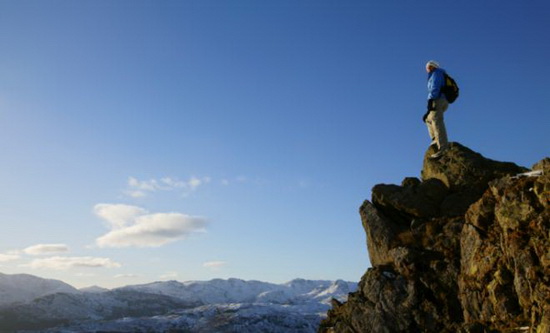Peak experiences as per Abraham Maslow’s definition play an important role in self-actualization.
In Abraham Maslow’s (1908-1970) famous Hierarchy of Needs, self-actualization is located at the very top of the pyramid, representing the need to fulfill one’s individual potential.
Peak experiences are described by Maslow (Religion, Values and Peak Experiences, 1971) as especially joyous and exiting moments in life, involving sudden feelings of intense happiness and well-being, wonder and awe, and possibly also involving an awareness of transcendental unity or knowledge of higher truth. They usually come on suddenly and are often inspired by deep meditation, intense feelings of love, exposure to great art or music, or the overwhelming beauty of nature.

Maslow describes peak experiences as
• uplifting and ego-transcending
• releasing creative energies
• affirming the meaning and value of existence
• giving a sense of purpose to the individual
• giving a feeling of integration
• leaving a permanent mark on the individual
• changing the person for the better
Peak experiences can be therapeutic in that they tend to increase the individual’s free will, self-determination, creativity and empathy. The highest peaks include “feelings of limitless horizons opening up to the vision, the feeling of being simultaneously more powerful and also more helpless than one was ever before, the feeling of great ecstasy and wonder and awe, and the loss of placing in time and space.” When peak experiences are especially powerful, the sense of self dissolves into an awareness of a greater unity.
Maslow claimed that all individuals are capable of peak experiences. Virtually everyone, he suggested, has a number of peak experiences in the course of their life, but often such experiences either go unrecognized, misunderstood or are simply taken for granted.
In so-called non-peakers, peak experiences are somehow resisted and suppressed. Maslow argued that peak experiences should be studied and cultivated, so that they can be introduced to those who have never had them or who resist them, providing them a route to achieve personal growth, integration, and fulfillment.
He defined lengthy, willfully induced peak experiences as a characteristic of the self-actualized. He described it as a state of witnessing or cognitive blissfulness, the achievement of which requires a lifetime of effort.
Peak experiences bear similarities to the concept of “flow” (1975), described by psychologist Miháli Csikszentmihalyi. Flow can happen when a person is having a peak experience, but obviously not all instances of flow qualify as peak experiences.
Since then, not much research on peak experiences has been conducted.
Osho calls Maslow one of the deepest psychologists of this century in the West:
Psychoanalysis and psychiatry help ill people. Religion helps people who are already well but would like to know the peaks of wellness – would like to go to the Everest of wellness, what Abraham Maslow calls ‘peak experiences’. Those peak experiences are everybody’s birthright. And if you don’t have peak experiences you are missing something immensely valuable.
But religion goes even one step further ahead than Abraham Maslow and humanistic psychologies. It is not only a question of attaining peak experiences – because peak experiences will come and go. You cannot remain on the peak forever. You can have a deep sexual orgasmic experience, you can attain to a peak – but the moment you have attained, already you have started going downhill. You cannot stay on the peak; there is no space to stay.
All peaks are the repetition of the ancient myth of Sisyphus. Sisyphus carries the rock to the peak of the hill, but the peak is small and the rock is big. Sisyphus has been punished by the gods, because he rebelled against the gods, to take the rock to the peak. But the moment the rock reaches the peak it starts falling back, slipping back, downhill.
That is the story of every man. You cannot stay on the peak. You will make the journey, the long journey, to reach the peak – and once you have attained, it is finished. The moment you become aware of the peak, it is no more; you have started going downhill. There is no space to abide.
Religion helps you not only for peak experiences – that is only for the beginners – religion does not help you only to have beautiful experiences, but to have a total orgasmic consciousness. Not the peak experience, not the orgasmic experience, but an orgasmic consciousness – so that you are twenty-four hours in an orgasmic ecstasy. So that your whole life, moment-to-moment, is a celebration.
My effort here is that of religion. I help people first to know peak experiences so that a great longing can arise in them to abide on those peaks. But one cannot abide on those peaks. Then another effort starts in your life: how to create orgasmic consciousness. Peaks are experiences, they come and go. Orgasmic consciousness is a transformation of your being. It is a new birth, a resurrection. But attaining to peak experiences helps many ill people. I am not concerned with it, but it helps.
Osho, Philosophia Perennis, Vol 2, Ch 7, Q 3 (excerpt)
Text by Marc




Comments are closed.